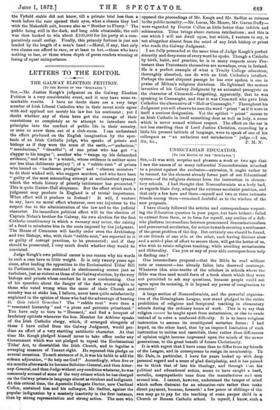LETTERS TO THE EDITOR.
THE GALWAY ELECTION PETITION.
[TO THE EDITOR OF THE "SPECTATOR ']
SIR,-Mr. Justice Keogh's judgment on the Galway Election Petition is a very considerable event, and it may have some re-
markable results. I have no doubt there are a very large number of Irish Liberal Catholics who in their secret souls agree with and applaud not merely his law but his sentiment ; yet I doubt whether any of them have got the courage of their convictions so completely as to attempt to introduce such principles into the conduct of public life in their country, or even to avow them out of a club-room. I can understand the effect produced on the English imagination by the spec. tacle of an Irish Catholic judge, who speaks of priests and bishops as if they were the scum of the earth,—" audacious," -" mendacious," " dreadful "; of one priest who has got "a clapper to his tongue "; another who "vamps up his debauched evidence," and who is "a wretch, whose evidence is neither more nor less than deliberate perjury "; of a " rabble-rout " of priests who hound on loathsome prodigies" and "obscene monsters to do their wicked will, who suggest murders, and who have been "guilty of the most astounding attempt at ecclesiastical tyranny which the whole history of priestly intolerance has presented." This is quite Exeter-Hall eloquence. But the effect which such a judgment may produce in England is of trivial importance. What effect will it produce in Ireland ? It will, I venture to say, have no moral effect whatever, save one injurious to the respect due to the administration of the law and to the judicial character. Its immediate political effect will be the election of Captain Nolan's brother for Galway, his own election for the first Catholic constituency in which a vacancy may occur, the raising of a fund to reimburse him in the costs imposed by the judgment. 'The House of Commons will hardly order even the Archbishop and two Bishops, who, with their "rabble-rout," are reported to it as guilty of corrupt practices, to be prosecuted ; and if they should be prosecuted, I very much doubt whether they would be convicted.
Judge Keogh's own political career is one reason why his words in such a case have so little weight. It is only twenty years ago since, after leading the opposition to the Ecclesiastical Titles' Bill in Parliament, he was sustained in electioneering scenes just as turbulent, just as violent as those of the Galway election, by the very bishops and priests whose conduct he is now condemning. One of his speeches about the danger of the dark winter nights to those who voted wrong when the cause of their Church and country was at stake has, I believe, never been quite satisfactorily explained in the opinion of those who had the advantage of hearing it. Quis talent Gracchos? The "rabble rout" were then a "venerated hierarchy" and "a pious and patriotic priesthood." You have only to turn to "Hansard," and find a bouquet of laudatory epithets whenever the hon. Member for Athlone speaks of the Irish Catholic clergy, which, if arranged alongside of those I have culled from the Galway Judgment, would pro- duce an effect of a very startling antithetic character. At that time Mr. Keogh pledged himself never to take office under any Government which was not pledged to repeal the Ecelesiastical Titles' Act, to disestablish the Irish Church, and to legalise a sweeping measure of Tenant-right. He repeated this pledge on several occasions. To each sentence of it, it was his habit to add the solemn adjuration, "So help me God!" Accordingly, when five or six months afterwards he became Solicitor-General, and then Attor- ney-General, and then J udge without any condition whatever, he was -commonly accused of some of the very crimes which he has charged on the Galway priests in language almost as virulent and indignant. At this critical time, the Apostolic Delegate Doctor, now Cardinal Cullen, sustained him and his colleague, Mr. Sadlier, against the popular indignation by a masterly inactivity in the first instance, then by strong representation and strong action. The men who
opposed the proceedings of Mr. Keogh and Mr. Sadlier as ruinous to the public morality,—Mr. Lucas, Mr. Moore, Mr. Gavan Duffy— were regarded by Doctor Cullen as little better than infidels and schismatics. Time brings about curious retributions ; and this is one which I will not dwell upon, but which, I venture to say, is not altogether absent from the mind of any Irish bishop or priest who reads the Galway Judgment.
I am fully persuaded at the same time of Judge Keogh's perfect sincerity and deep sense of every word he spoke. Though a Catholic by birth, habit, and practice, he is in many respects more Pro- testant than Protestants themselves are nowadays, even in Ireland. He is a perfect example of what a Trinity College education, thoroughly absorbed, can do with an Irish Catholic's intellect. Perhaps the most eloquent passage he has ever spoken is one in praise of Milton's religious doctrines. He lightened the morose invective of his Galway Judgment by an animated panegyric on the character of Cromwell—forgetting, apparently, that he was speaking in Connaught, and that it was Cromwell who gave Irish Catholics the alternative of "Hell or Connaught." Throughout his Judgment you will observe he uses the word " priest " as if it were in itself a noxious designation. Yet the epithet " priest" means to an Irish Catholic in itself something dear as well as holy, a name which is never named without respect. The effect on the ear is not less startling than if Lord Justice Christian, exceeding by a little his present latitude of language, were to speak of one of his colleagues as "an audacious and mendacious " judge.—I am,


































 Previous page
Previous page